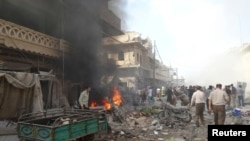Syrian government airstrikes killed at least 27 people and injured many others at a market near the northern city of Aleppo.
Activist groups, including the Britain-based Syrian Observatory for Human Rights, say government jets hit the crowded market in the town of Atareb, located in Aleppo province, early Thursday.
The strikes are the latest in the Syrian government's bombing campaign against rebel-held areas in Aleppo that began in December.
Meanwhile in Damascus, the United Nations was allowed to resume food distribution inside the besieged Yarmouk camp after being blocked for 15 days.
On Wednesday, U.N. Secretary-General Ban Ki-moon said the U.N. Security Council needed to take action to address what he calls "flagrant violations" of international law in Syria.
Ban said both the Syrian government and rebel fighters have failed to allow humanitarian access as demanded in a Security Council resolution passed in February.
He said the warring sides must also lift their sieges on populated areas, calling it "shameful" that people are forced to live under those conditions.
The Security Council also heard an update Wednesday from the international special coordinator overseeing the removal and destruction of Syria’s chemical weapons. Sigrid Kaag said 88 percent of Syria's declared chemicals have been removed or destroyed.
Nigeria's U.N. ambassador, Joy Ogwu, said council members expressed concern about allegations that chlorine gas was used in attacks in some Syrian towns, and called for an investigation.
Syrian Ambassador Bashar Jaafari denied "categorically" that government forces have used chlorine gas. He said if such an attack took place, it would have been done by terrorist groups.
Syrian officials have long used the term "terrorist" to describe opposition fighters who are trying to oust President Bashar al-Assad. Jaafari said the allegations are meant to undermine Syria's presidential election scheduled for June 3.
Some information for this report was provided by AP, AFP and Reuters.
Activist groups, including the Britain-based Syrian Observatory for Human Rights, say government jets hit the crowded market in the town of Atareb, located in Aleppo province, early Thursday.
The strikes are the latest in the Syrian government's bombing campaign against rebel-held areas in Aleppo that began in December.
Meanwhile in Damascus, the United Nations was allowed to resume food distribution inside the besieged Yarmouk camp after being blocked for 15 days.
On Wednesday, U.N. Secretary-General Ban Ki-moon said the U.N. Security Council needed to take action to address what he calls "flagrant violations" of international law in Syria.
Ban said both the Syrian government and rebel fighters have failed to allow humanitarian access as demanded in a Security Council resolution passed in February.
He said the warring sides must also lift their sieges on populated areas, calling it "shameful" that people are forced to live under those conditions.
The Security Council also heard an update Wednesday from the international special coordinator overseeing the removal and destruction of Syria’s chemical weapons. Sigrid Kaag said 88 percent of Syria's declared chemicals have been removed or destroyed.
Nigeria's U.N. ambassador, Joy Ogwu, said council members expressed concern about allegations that chlorine gas was used in attacks in some Syrian towns, and called for an investigation.
Syrian Ambassador Bashar Jaafari denied "categorically" that government forces have used chlorine gas. He said if such an attack took place, it would have been done by terrorist groups.
Syrian officials have long used the term "terrorist" to describe opposition fighters who are trying to oust President Bashar al-Assad. Jaafari said the allegations are meant to undermine Syria's presidential election scheduled for June 3.
Some information for this report was provided by AP, AFP and Reuters.





